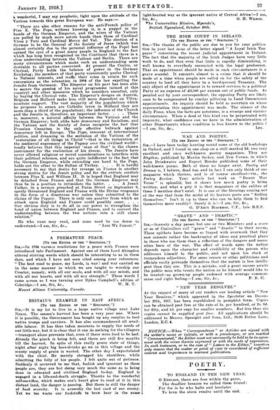BRITAIN'S EXAMPLE IN EAST AFRICA
[To THE EDITOR Or THE " SPECTATOR...3 SIR,—It is my lot to live in a large native village near Lake Nyasa. The season's harvest has been a very poor one. Where it is possible, the Government has bought up any surplus to feed native troops and carriers. It has also commandeered all avail- able labour. It has thus taken measures to supply the needs of our little war, but it is clear that it can do nothing for the villagers —transport alone prevents that, even if there were food to be had. Already the pinch is being felt, and there are still five months till the harvest. In spite of this really grave state of things, night after- night big beer-drinks go on in this village and the scanty supply of grain is wasted. The other day I expostulated with the chief. He merely shrugged his .shoulders, while admitting the folly of his people. I felt quite out of patience. Suddenly it occurred to me that, foolish and ignorant as these people are, they are but doing very much the same as is being done in educated and civilized England to-day. England is engaged in a life-and-death struggle. Thanks to the wonderful self-sacrifice, which makes one's heart glow to rend of it in this distant land, the danger is passing. But there is still the danger of food scarcity. It is avowedly the last card of our- enemy. Yet we too waste our foodstuffs to brew beer in the same
light-hearted way as the ignorant native of Central Africa!—I am,
Sir. &c., G. H. WILSON. rhe Universities fission, M panda's, British Nyasaland, October 30th.


























 Previous page
Previous page